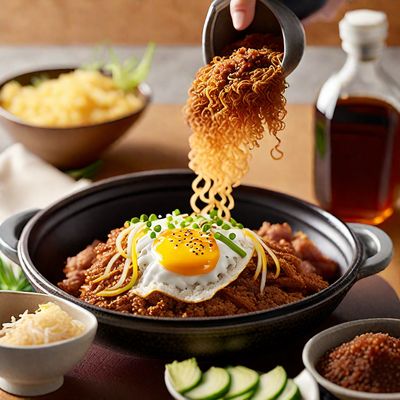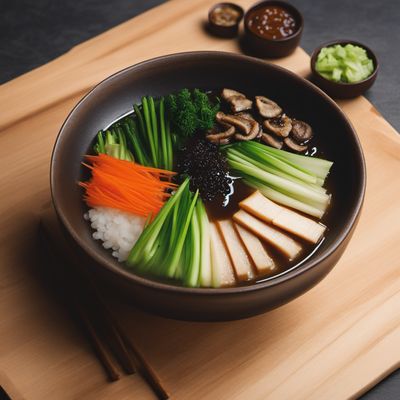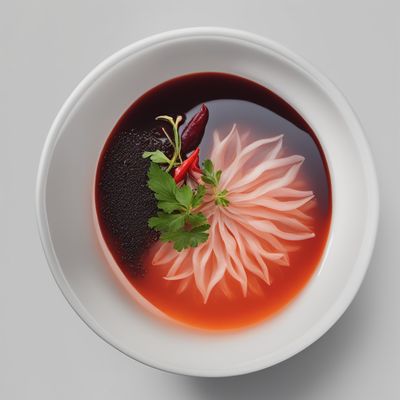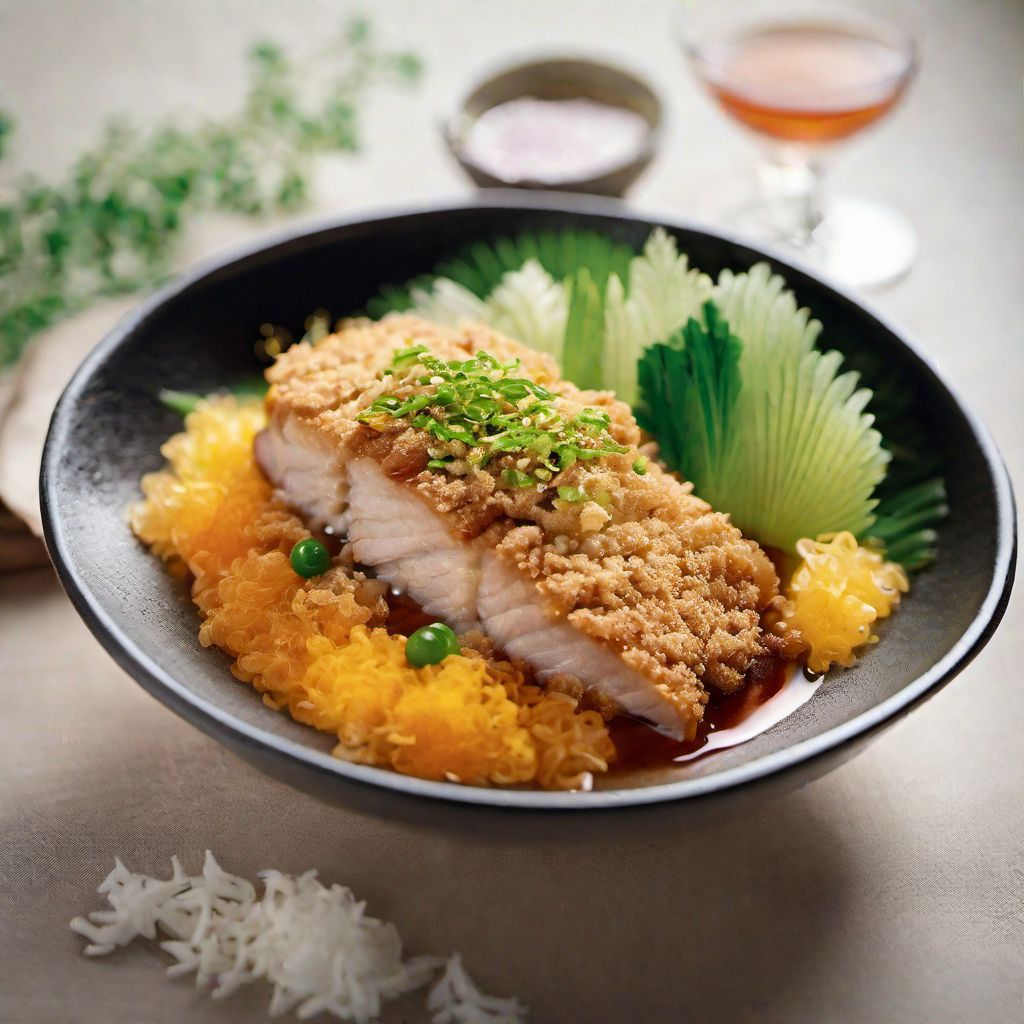
Recipe
Molecular Gastronomy Katsudon
The Futuristic Twist on Katsudon: Molecular Gastronomy Delight
4.7 out of 5
In the realm of molecular gastronomy, we reimagine the traditional Japanese dish, Katsudon, with a touch of innovation. This avant-garde version of Katsudon combines scientific techniques and artistic presentation to create a visually stunning and delectable experience. Get ready to embark on a culinary adventure like no other!
Metadata
Preparation time
60 minutes
Cooking time
30 minutes
Total time
90 minutes
Yields
4 servings
Preparation difficulty
Medium
Suitable for
Vegetarian (if pork is substituted with tofu or seitan), Pescatarian (if pork is substituted with fish), Gluten-free (if bread crumbs are substituted with gluten-free bread crumbs), Dairy-free (if egg custard is omitted), Low-carb (if rice is substituted with cauliflower rice)
Allergens
Pork, Eggs, Wheat (if using regular bread crumbs)
Not suitable for
Vegan, Paleo, Keto, Nut-free, Soy-free
Ingredients
While the original Katsudon features a breaded and deep-fried pork cutlet served over a bed of rice and topped with a savory egg sauce, our molecular gastronomy adaptation takes a more experimental approach. We will deconstruct the dish, transforming the pork cutlet into a delicate foam, the rice into a gel, and the egg sauce into a flavorful sphere. The result is a visually captivating and texturally intriguing interpretation of the classic Katsudon. We alse have the original recipe for Katsudon, so you can check it out.
-
200g (7 oz) pork tenderloin 200g (7 oz) pork tenderloin
-
10g (0.35 oz) bread crumbs 10g (0.35 oz) bread crumbs
-
2g (0.07 oz) sodium alginate 2g (0.07 oz) sodium alginate
-
500ml (2 cups) water 500ml (2 cups) water
-
2g (0.07 oz) calcium lactate 2g (0.07 oz) calcium lactate
-
100g (3.5 oz) sushi rice 100g (3.5 oz) sushi rice
-
200ml (0.8 cups) chicken broth 200ml (0.8 cups) chicken broth
-
2g (0.07 oz) agar-agar 2g (0.07 oz) agar-agar
-
2 eggs 2 eggs
-
10ml (2 tsp) soy sauce 10ml (2 tsp) soy sauce
-
5g (0.18 oz) sugar 5g (0.18 oz) sugar
-
5g (0.18 oz) mirin 5g (0.18 oz) mirin
-
5g (0.18 oz) cornstarch 5g (0.18 oz) cornstarch
-
Vegetable oil for frying Vegetable oil for frying
-
Salt and pepper to taste Salt and pepper to taste
-
Fresh chives for garnish Fresh chives for garnish
Nutrition
- Calories: 350 kcal / 1465 KJ
- Fat: 12g (5g saturated)
- Carbohydrates: 35g (5g sugars)
- Protein: 25g
- Fiber: 2g
- Salt: 2g
Preparation
-
1.Slice the pork tenderloin into thin strips and season with salt and pepper.
-
2.In a bowl, combine the bread crumbs with a pinch of salt. Coat the pork strips with the bread crumbs.
-
3.In a small saucepan, bring the water to a boil. Dissolve the sodium alginate in the boiling water and let it cool.
-
4.In another bowl, mix the calcium lactate with 500ml (2 cups) of water until dissolved.
-
5.Dip each breaded pork strip into the sodium alginate solution, then transfer it to the calcium lactate solution. Let it sit for 5 minutes to form a gel-like coating.
-
6.Rinse the gel-coated pork strips under cold water and pat them dry.
-
7.Cook the sushi rice according to package instructions and set aside.
-
8.In a separate saucepan, bring the chicken broth to a boil. Add the agar-agar and stir until dissolved. Let it cool and set to form a gel.
-
9.In a bowl, whisk the eggs, soy sauce, sugar, and mirin together. Cook the egg mixture in a non-stick pan over low heat, stirring gently until it forms a soft custard-like texture. Set aside.
-
10.Heat vegetable oil in a deep pan or fryer. Fry the gel-coated pork strips until golden brown and crispy. Remove from the oil and drain on a paper towel.
-
11.Dissolve the cornstarch in a small amount of water to create a slurry. Heat the chicken broth with agar-agar again and add the cornstarch slurry to thicken the sauce.
-
12.To assemble, place a spoonful of sushi rice on a plate. Top it with the crispy pork foam, a dollop of egg custard, and a drizzle of the thickened chicken broth sauce. Garnish with fresh chives.
Treat your ingredients with care...
- Pork tenderloin — Choose a lean cut of pork for a healthier option.
- Sodium alginate — Handle with care as it can cause skin irritation. Follow the instructions for proper usage.
- Sushi rice — Rinse the rice thoroughly before cooking to remove excess starch and achieve a fluffy texture.
- Agar-agar — Use a kitchen scale to measure agar-agar accurately, as it is essential for the gel formation.
- Fresh chives — Finely chop the chives just before serving to maintain their vibrant color and fresh flavor.
Tips & Tricks
- For a more intense flavor, marinate the pork tenderloin in soy sauce and ginger before breading.
- Experiment with different shapes and sizes for the gel-coated pork strips to create unique presentations.
- Use a syringe or dropper to carefully drop the egg custard mixture into a cold oil bath to form perfect spheres.
- Garnish the dish with edible flowers or microgreens to add a touch of elegance.
- Serve the Molecular Gastronomy Katsudon on a sleek, modern plate to enhance the futuristic aesthetic.
Serving advice
Serve the Molecular Gastronomy Katsudon as a main course, accompanied by a side dish or salad. The dish is best enjoyed immediately after assembly to fully appreciate the textures and flavors.
Presentation advice
Create an artistic presentation by arranging the gel-coated pork strips in a spiral pattern on top of the sushi rice. Place the egg custard sphere delicately on the side and drizzle the thickened chicken broth sauce in an elegant design. Garnish with fresh chives for a pop of color.
More recipes...
For Katsudon » Browse all
For Japanese cuisine » Browse all
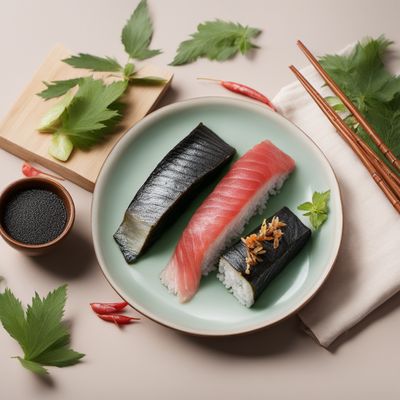
Narezushi - Traditional Japanese Fermented Sushi
Umami Delight: Narezushi - A Journey into Japanese Fermented Sushi

Peanut Butter Mochi Delight
Peanut Butter Mochi: A Nutty Twist on a Japanese Delicacy
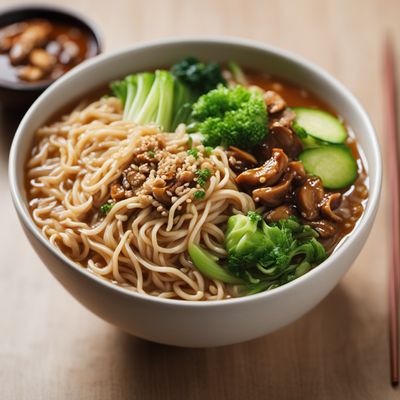
Homemade Japanese-Inspired Cup Noodles
Savory Delights in a Cup: Homemade Japanese-Inspired Cup Noodles
More Japanese cuisine dishes » Browse all

Hirame nigiri sushi
Fluke Nigiri
Hirame nigiri sushi is a type of sushi that consists of a small ball of sushi rice topped with a piece of flounder. It is a popular sushi dish...

Kasutera
Castella Cake
Kasutera, also known as Castella, is a traditional Japanese sponge cake that is made with flour, sugar, and eggs.

Sara udon
Thin Udon Noodles
Sara udon is a Japanese noodle dish that originated in Hokkaido. It is a hearty and flavorful dish that is popular throughout the country.
